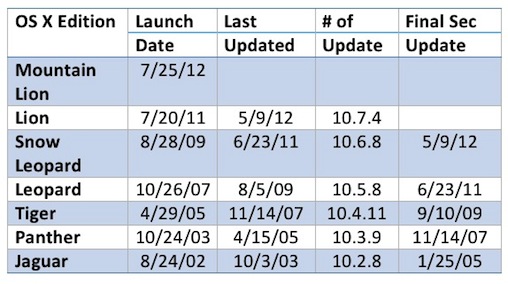Apple's refusal to put into writing its operating system support policy leaves Snow Leopard users wondering whether their copy of OS X has been retired, security experts said today.
The question "Is Snow Leopard retired?" went legitimate as soon as Apple launched OS X Mountain Lion last week.
That's because Apple has always dropped security update support for one edition around the time it has two newer in play. If the current OS X is dubbed "n," then "n-2" support ends at the debut of "n."
In other words, patches are provided only to the newest OS X and the one immediately preceding it. With Mountain Lion's debut last Wednesday, that informal policy -- Apple has never put its support practices on paper or its website -- means the two editions that will receive patches are OS X 10.7, aka 2011's Lion, and the brand new 10.8, or Mountain Lion.
Apple last shipped a Snow Leopard security update in May 2012.
"I would expect that Snow Leopard is toast," said Chet Wisniewski, senior security adviser at Sophos, when asked today of his expectations. "They seem to apply that 'n-2' rule [of no security updates] somewhat universally, even when it doesn't make sense."
Apple has held to the n-2 rule, although the timing of an edition's final update has varied.
Last year, Apple shipped the last OS X-wide security update for Leopard (n-2), the edition released in Oct. 2007, on June 23, 2011, almost a month before the launch of Lion (n). OS X Tiger (n-2), which appeared in April 2005, received a final security update on Sept. 10, 2009, 12 days after Snow Leopard (n) shipped.
Prior to that, Panther (n-2), or OS X 10.3, got its final update two-and-a-half weeks after the debut of Leopard (n), while OS X 10.2, aka Jaguar (n-2), saw its last patch three months before the launch of Tiger (n).
An edition's retirement isn't comprehensive. Apple has typically delivered separate security updates for four components: iTunes, Java, QuickTime and Safari for several months beyond the cut-off.

Apple usually delivers the final security update for an older edition ('n-2') around the time when a new upgrade ('n') ships. (Data: Apple.)
For example, Apple updated iTunes for Leopard as recently as last month, and patched QuickTime in August 2011. (The company also shipped a security-related update for Leopard in May 2012 that did not patch any vulnerabilities but instead disabled long-outdated versions of Adobe's Flash Player, one of several moves made this spring to protect Mac users from the Flashback malware.)
The problem isn't necessarily that Apple retires each edition of OS X -- every software vendor does that -- but that it won't tell customers when it does.
"We're here speculating on whether Snow Leopard is supported or not," said Wisniewski. "It's like we're forced to read tea leaves. It's kind of unfortunate."
Andrew Storms, director of security operations at nCircle Security, echoed that.
"That's the same old story with Apple," said Storms in an interview conducted over instant messaging. "It's never really clear when they discontinue support. While they have some data about lifecycle support, Apple fails at actually making any effort to tell people as much. They'd rather spend the time telling you all the cool stuff about the new OS."
Both Wisniewski and Storms contrasted Apple's practice with Microsoft, which describes Windows' support policy on its website, and generally patches the OS for a decade, no matter how many successors ship during that stretch.
Another Sophos researcher pointed out that the omission of a Safari update for Snow Leopard was another hint that OS X 10.6 faces retirement.
"And on [the Safari download] page, the fine print states: The latest version of Safari is available for Mountain Lion. The latest version of Safari for Lion is available through Software Update," observed Joshua Long in a Monday blog post. There's no mention of [Safari for] Windows or Snow Leopard."
Apple patched 121 vulnerabilities in Safari for Lion and Mountain Lion.
Snow Leopard's status is important to a lot of users: According to Web analytics company Net Application, 38% of all Macs were powered by that edition last month.
Wisniewski reminded Snow Leopard users that they can probably upgrade to Mountain Lion, which of course will receive security updates. And even in the absence of any future patches, their current OS will continue to work.
"But the best way to stop an attack is to patch the vulnerability," Wisniewski added.
Apple did not reply to questions about whether Snow Leopard will continue to receive security updates, and if so, for how long.





